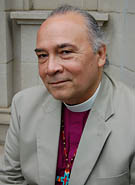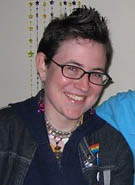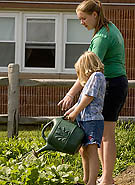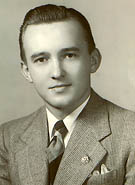Erin Reed '08 and Lots to Gardens receive 2008 Stringfellow Awards
|
The Right Rev. Steven Charleston, president and dean of Episcopal Divinity School in Cambridge, Mass., recently visited Bates College to speak and present the annual William Stringfellow Awards in Justice and Peace.
Charleston’s lecture honored the legacy of William Stringfellow, Bates class of 1949, a lawyer and lay theologian prominent in the American peace movement. His visit coincided with the 2008 William Stringfellow Awards for Justice and Peace, presented this year to Bates senior Erin Reed of Wareham, Mass., and the Lots to Gardens program of Lewiston.
The Stringfellow Awards honor recipients in two categories: a current student or student organization at Bates College, and a citizen or organization in Maine. Recipients reflect the character, values and commitments of Stringfellow, “a man whose life and work are of inestimable significance to the movements for justice and peace in this country and around the world,” says Bates College Chaplain Bill Blaine-Wallace.
The former bishop of Alaska, Charleston has a long history of active engagement in ministries of reconciliation and justice. He is the author of Good News: A Congregational Resource for Reconciliation (Episcopal Divinity School, 2003) and is the host of the popular blog “Stepping Stones.” Recently recognized at the National Cathedral as “one of the 10 best preachers in America,” Charleston is an advocate for spiritual renewal and environmental action. He is the founder of the “Genesis Covenant” movement, an international effort to halt climate change.
Reed will graduate in May with a degree in sociology. She has been involved in social justice work since she moved to Lewiston in 2004 to begin classes at Bates.
While at Bates, Reed has served as a coordinator for New World Coalition, People Eating Plants and OUTfront. She has organized speakers, movie screenings, fundraisers and trips to conferences and protests. Reed has worked with Lots to Gardens since her first week in Maine, and last spring traveled to Biloxi, Miss., where she volunteered with Hands on Gulf Coast. She has participated in the Sisters of Charity Food Pantry Advisory Board, the Maine College Action Network and the 2006 Maine Won’t Discriminate campaign. During her first year at Bates she camped on the historic Quad as part of the CAMPaign for Community action in support of the Visible Community, a grassroots neighborhood planning group.
 For two years, Reed has served the Bates College Harward Center for Community Partnerships as a student volunteer fellow, coordinating Bates volunteers at the afterschool program and soup kitchen run by the Trinity Jubilee Center. She has been involved in a local non-profit bike shop, Spoke Folks, since its beginning in 2004. She received a summer 2007 grant from the Harward Center to develop summer programming there and was one of the mechanics who visited sites around Lewiston to teach bicycle maintenance and repair and to distribute helmets.
For two years, Reed has served the Bates College Harward Center for Community Partnerships as a student volunteer fellow, coordinating Bates volunteers at the afterschool program and soup kitchen run by the Trinity Jubilee Center. She has been involved in a local non-profit bike shop, Spoke Folks, since its beginning in 2004. She received a summer 2007 grant from the Harward Center to develop summer programming there and was one of the mechanics who visited sites around Lewiston to teach bicycle maintenance and repair and to distribute helmets.
Lots to Gardens has blossomed into a community-based program that uses urban gardens to create access to nutritious food, empower youth and
build a healthy community.
Lots to Gardens’ first garden was created at Hillview Apartments, a public housing complex, with support from a community work-study fellowship at Bates. Since 1999, Lots to Gardens has grown to steward 15 gardens and greenspaces in four diverse neighborhoods in Lewiston. A program of Sisters of Charity Health System, Lots to Gardens’ core beliefs are that food should be healthy, affordable, culturally appropriate and easily available to all; youth are necessary partners in creating social change; people affected by hunger must be included as leaders in building equitable food systems; and a just food system depends upon thriving and sustainable local agriculture. These beliefs drive Lots to Gardens as they grow, dig in their roots and continue to work for social change in the community.
Lots to Gardens’ diverse community food work supports 60 families annually in growing their own food; provides summer-long intensive training and empowerment programs to local teenagers; and engages low-income residents in food security projects as leaders. Creating neighborhood sources for fresh vegetables, including the Lewiston Farmers’ Market, and providing access to nutritional education are key strategies in their effort to build a sustainable food system. 
Through Lots to Gardens’ programs, youth have real opportunities for personal growth and community engagement. In addition to learning to grow, harvest and cook healthy food, the young participants benefit from in-depth training, leadership development and service experience. More importantly, youth begin to see themselves as valuable, contributing community members.
A few more Lots-to-Gardens 2007 snapshots include:
• Youth participants completed more than 3,000 hours of community service;
• More than 60 community and senior gardeners grew food for themselves in community gardens;
• More than 70 free, healthy-cooking classes were offered at four sites and attended by more than 600 youth, adults and seniors;
• Lots to Gardens’ youth interns led a healthy communication workshop at the national Rooted in Community conference in Philadelphia;
• Lots to Gardens’ youth traveled to Anaheim, Calif., to help solidify Lewiston’s winning bid for the National Civic League’s All-American City award.
 Above, William Stringfellow ’49. Below right, the Right Rev. Steven Charleston. Below left, Stringfellow winner Erin Reed ’08. Bottom right, Emily Bright ’07 works with a Lewiston child in the Lots to Gardens program.
Above, William Stringfellow ’49. Below right, the Right Rev. Steven Charleston. Below left, Stringfellow winner Erin Reed ’08. Bottom right, Emily Bright ’07 works with a Lewiston child in the Lots to Gardens program.

